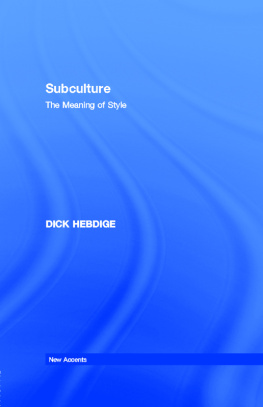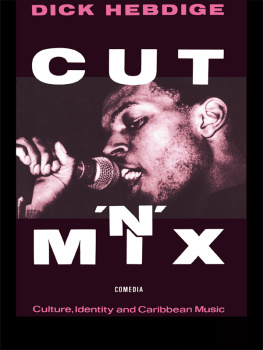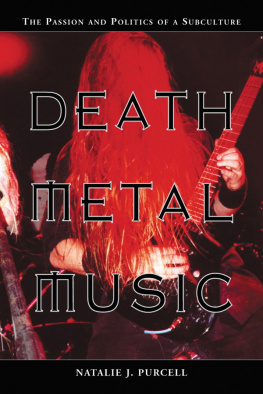Hebdige - Subculture
Here you can read online Hebdige - Subculture full text of the book (entire story) in english for free. Download pdf and epub, get meaning, cover and reviews about this ebook. publisher: Routledge, genre: Religion. Description of the work, (preface) as well as reviews are available. Best literature library LitArk.com created for fans of good reading and offers a wide selection of genres:
Romance novel
Science fiction
Adventure
Detective
Science
History
Home and family
Prose
Art
Politics
Computer
Non-fiction
Religion
Business
Children
Humor
Choose a favorite category and find really read worthwhile books. Enjoy immersion in the world of imagination, feel the emotions of the characters or learn something new for yourself, make an fascinating discovery.
Subculture: summary, description and annotation
We offer to read an annotation, description, summary or preface (depends on what the author of the book "Subculture" wrote himself). If you haven't found the necessary information about the book — write in the comments, we will try to find it.
Subculture — read online for free the complete book (whole text) full work
Below is the text of the book, divided by pages. System saving the place of the last page read, allows you to conveniently read the book "Subculture" online for free, without having to search again every time where you left off. Put a bookmark, and you can go to the page where you finished reading at any time.
Font size:
Interval:
Bookmark:
SUBCULTURE
THE MEANING OF STYLE
IN THE SAME SERIES
The Empire Writes Back: Theory and practice in postcolonial literatures Bill Ashcroft, Gareth Griffiths, and Helen Tiffin
Translation Studies Susan Bassnett
Rewriting English: Cultural politics of gender and class Janet Batsleer, Tony Davies, Rebecca ORourke, and Chris Weedon
Critical Practice Catherine Belsey
Formalism and Marxism Tony Bennett
Dialogue and Difference: English for the nineties ed. Peter Brooker and Peter Humm
Telling Stories: A theoretical analysis of narrative fiction Steven Cohan and Linda M. Shires
Alternative Shakespeares ed. John Drakakis
The Semiotics of Theatre and Drama Keir Elam
Reading Television John Fiske and John Hartley
Linguistics and the Novel Roger Fowler
Return of the Reader: Reader-response criticism Elizabeth Freund
Making a Difference: Feminist literary criticism ed. Gayle Greene and Copplia Kahn
Superstructuralism: The philosophy of structuralism and post-structuralism Richard Harland
Structuralism and Semiotics Terence Hawkes
Dialogism: Bakhtin and his world Michael Holquist
Popular Fictions: Essays in literature and history ed. Peter Humm, Paul Stigant, and Peter Widdowson
The Politics of Postmodernism Linda Hutcheon
Fantasy: The literature of subversion Rosemary Jackson
Sexual/Textual Politics: Feminist literary theory Toril Moi
Deconstruction: Theory and practice Christopher Norris
Orality and Literacy: The technologizing of the word Walter J. Ong
Narrative Fiction: Contemporary poetics Shlomith Rimmon-Kenan
Adult Comics: An introduction Roger Sabin
Criticism in Society Imre Salusinszky
Metafiction: The theory and practice of self-conscious fiction Patricia Waugh
Psychoanalytic Criticism: Theory in practice Elizabeth Wright
DICK HEBDIGE
SUBCULTURE
THE MEANING OF STYLE

First published in 1979 by Methuen & Co. Ltd
Routledge is an imprint of the Taylor & Francis Group
This edition published in the Taylor & Francis e-Library, 2002.
1979 Dick Hebdige
All rights reserved. No part of this book may be reprinted or reproduced or utilized in any form or by any electronic, mechanical, or other means, now known or hereafter invented, including photocopying and recording, or in any information storage or retrieval system, without permission in writing from the publishers.
British Library Cataloguing in Publication Data available
Library of Congress Cataloguing in Publication Data available
ISBN 0415039495 (Print Edition)
ISBN 0-203-13994-1 Master e-book ISBN
ISBN 0-203-22092-7 (Glassbook Format)
General Editors Preface
I T is easy to see that we are living in a time of rapid and radical social change. It is much less easy to grasp the fact that such change will inevitably affect the nature of those disciplines that both reflect our society and help to shape it.
Yet this is nowhere more apparent than in the central field of what may, in general terms, be called literary studies. Here, among large numbers of students at all levels of education, the erosion of the assumptions and presuppositions that support the literary disciplines in their conventional form has proved fundamental. Modes and categories inherited from the past no longer seem to fit the reality experienced by a new generation.
New Accents is intended as a positive response to the initiative offered by such a situation. Each volume in the series will seek to encourage rather than resist the process of change, to stretch rather than reinforce the boundaries that currently define literature and its academic study.
Some important areas of interest immediately present themselves. In various parts of the world, new methods of analysis have been developed whose conclusions reveal the limitations of the Anglo-American outlook we inherit. New concepts of literary forms and modes have been proposed; new notions of the nature of literature itself, and of how it communicates are current; new views of literatures role in relation to society flourish. New Accents will aim to expound and comment upon the most notable of these.
In the broad field of the study of human communication, more and more emphasis has been placed upon the nature and function of the new electronic media. New Accents will try to identify and discuss the challenge these offer to our traditional modes of critical response.
The same interest in communication suggests that the series should also concern itself with those wider anthropological and sociological areas of investigation which have begun to involve scrutiny of the nature of art itself and of its relation to our whole way of life. And this will ultimately require attention to be focused on some of those activities which in our society have hitherto been excluded from the prestigious realms of Culture.
Finally, as its title suggests, one aspect of New Accents will be firmly located in contemporary approaches to language, and a continuing concern of the series will be to examine the extent to which relevant branches of linguistic studies can illuminate specific literary areas. The volumes with this particular interest will nevertheless presume no prior technical knowledge on the part of their readers, and will aim to rehearse the linguistics appropriate to the matter in hand, rather than to embark on general theoretical matters.
Each volume in the series will attempt an objective exposition of significant developments in its field up to the present as well as an account of its authors own views of the matter. Each will culminate in an informative bibliography as a guide to further study. And while each will be primarily concerned with matters relevant to its own specific interests, we can hope that a kind of conversation will be heard to develop between them: one whose accents may perhaps suggest the distinctive discourse of the future.
TERENCE HAWKES
Acknowledgements
MANY people have assisted in different ways in the writing of this book. I should like in particular to thank Jessica Pickard and Stuart Hall for generously giving up valuable time to read and comment upon the manuscript. Thanks also to the staff and students of the University of Birmingham Centre for Contemporary Cultural Studies, and to Geoff Hurd of Wolverhampton Polytechnic for keeping me in touch with the relevant debates. I should also like to thank Mrs Erica Pickard for devoting so much time and skill to the preparation of this manuscript. Finally, thanks to Duffy, Mike, Don and Bridie for living underneath the Law and outside the categories for so many years.
Introduction: Subculture and Style
I managed to get about twenty photographs, and with bits of chewed bread I pasted them on the back of the cardboard sheet of regulations that hangs on the wall. Some are pinned up with bits of brass wire which the foreman brings me and on which I have to string coloured glass beads. Using the same beads with which the prisoners next door make funeral wreaths, I have made star-shaped frames for the most purely criminal. In the evening, as you open your window to the street, I turn the back of the regulation sheet towards me. Smiles and sneers, alike inexorable, enter me by all the holes I offer. They watch over my little routines.
(Genet, 1966a)
I N the opening pages of The Thiefs Journal
Next pageFont size:
Interval:
Bookmark:
Similar books «Subculture»
Look at similar books to Subculture. We have selected literature similar in name and meaning in the hope of providing readers with more options to find new, interesting, not yet read works.
Discussion, reviews of the book Subculture and just readers' own opinions. Leave your comments, write what you think about the work, its meaning or the main characters. Specify what exactly you liked and what you didn't like, and why you think so.







